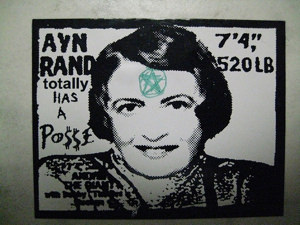Outgrowing Ayn Rand
For the failure of such a wide swath of the American population to outgrow individual self-interest, the United States may as well be a nation full of teenagers, says Victoria Bekiempis, a “recovering Objectivist” writing in The Guardian.
For the failure of such a wide swath of the American population to outgrow individual self-interest, the United States may as well be a nation full of teenagers, says Victoria Bekiempis, a “recovering Objectivist” writing in The Guardian.
Ayn Rand is the early 20th-century founder of Objectivisim, an ideology that states that the pursuit of one’s self-interest, regardless of ethical concerns, is the highest good, and anything that interferes with it is evil.
Rand is not recognized as a serious thinker by most practitioners of academic philosophy, and she is regarded as more of “a hypocritical, questionable character than a moral role model” by many others, Bekiempis says.
Rand’s personal life was no testament to social concern. As a teenager in Russia, she “watched her family nearly starve while she treated herself to the theater.” In America she reaped the benefits of Social Security and Medicare while attacking government on the pages of her novels. Sex mingled with violence in her work, and she based one of her early protagonists on the serial killer William Hickman.
— Posted by Alexander Reed Kelly. Follow him on Twitter: @areedkelly.
Your support matters…Victoria Bekiempis at The Guardian:
Of course, all that doesn’t actually say anything about her “philosophy”; it just makes the case that she’s a jerk and a hack. That said, her theory – and summarily, its corollaries – are belied by the abject sketchiness of their most basic premise: rational egoism. Far smarter, more articulate people than me have pointed this out, but what needs to be emphasized is that Rand conflates descriptive psychological egoism (people act in their self-interest) with normative ethical egoism (acting in self-interest is the right thing to do). Part of this “ought-from-an-is”-type assumption is that altruism does not exist – very much the backbone of her belief system.
West Valley College’s Sandra LaFave does a great job following this line of thought and pointing out why it doesn’t work. The basic claim of egoists, LaFave notes, is that people “always and invariably act in their self-interest”. However, most moral codes call for altruism, which, in egoists’ account, is “demanding the impossible”. Moral codes, so egoists’ thinking goes, should not demand “the impossible”, so we should take up a “more realistic” system such as – ta-da! – ethical egoism.
To accept this conclusion, you have to accept the premise that psychological egoism is a given fact in the first place. To date, neither Rand nor anyone else has been able to prove definitively that the proverbial soldier who dives on a grenade acts selfishly, not altruistically.
Independent journalism is under threat and overshadowed by heavily funded mainstream media.
You can help level the playing field. Become a member.
Your tax-deductible contribution keeps us digging beneath the headlines to give you thought-provoking, investigative reporting and analysis that unearths what's really happening- without compromise.
Give today to support our courageous, independent journalists.






You need to be a supporter to comment.
There are currently no responses to this article.
Be the first to respond.